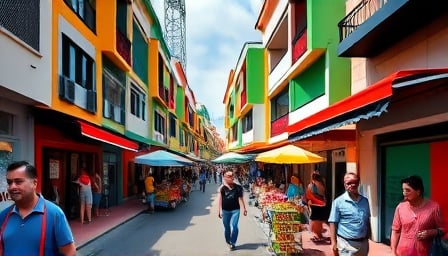Market‑Wide Impact of Amazon’s Entry in Brazil on MercadoLibre
MercadoLibre Inc., the preeminent online marketplace in Latin America, has experienced a noticeable decline in its share price in recent trading sessions. The downturn coincides with intensified competition from Amazon, which has increased its presence in the Brazilian e‑commerce sector—a market that represents a significant portion of MercadoLibre’s revenue base. The stock’s volatility is further compounded by a lower target price issued by JPMorgan, a major institutional analyst that forecasts the company will fall short of its third‑quarter earnings expectations.
Competitive Dynamics in Brazil
Amazon’s strategic push into Brazil, involving aggressive price‑matching initiatives, enhanced logistics infrastructure, and localized product assortments, has exerted downward pressure on MercadoLibre’s market share. Historically, MercadoLibre has leveraged its strong distribution network, extensive user base, and integrated fintech offerings—such as MercadoPago—to maintain a competitive edge. However, the recent Amazon activity has disrupted traditional cost‑and‑value dynamics, prompting investors to reassess the relative positioning of the two firms.
Analyst Outlook and Earnings Guidance
JPMorgan’s revised target price reflects a cautious stance toward MercadoLibre’s near‑term profitability. The brokerage notes that anticipated earnings shortfall for the upcoming quarter may stem from higher marketing spend, increased returns, and the capital outlays required to counter Amazon’s market penetration. While this short‑term outlook tempers investor enthusiasm, it does not alter the underlying fundamentals that have historically driven MercadoLibre’s growth trajectory.
Long‑Term Value Proposition
Despite the immediate headwinds, several analysts maintain that MercadoLibre remains an attractive long‑term investment. Key points supporting this perspective include:
Dominant Regional Presence: MercadoLibre holds a substantial share of the Latin American e‑commerce market, with robust penetration in countries such as Argentina, Mexico, and Brazil. Its platform benefits from a large, loyal customer base that continues to grow as internet penetration deepens across the region.
Diversified Revenue Streams: Beyond marketplace commissions, MercadoLibre generates significant income from its fintech suite (e.g., digital payments, credit, and loan services) and advertising solutions. These ancillary businesses provide revenue resilience against fluctuations in core marketplace performance.
Operational Adaptability: The company’s track record of swift adaptation to evolving market conditions—illustrated by rapid scaling of logistics, strategic partnerships, and technology investments—underscores its capacity to manage competitive challenges.
Cross‑Sector Implications
The competitive pressure from Amazon in Brazil underscores broader trends that transcend individual sectors:
Digital Disruption of Traditional Retail: The ongoing shift toward online shopping has intensified competition among e‑commerce platforms globally, compelling incumbents to innovate continually.
Fintech Integration as a Growth Lever: MercadoLibre’s fintech initiatives exemplify how non‑traditional revenue channels can stabilize cash flows, a strategy increasingly adopted by peer companies across various regions.
Geographic Expansion vs. Localized Competition: As global players enter emerging markets, local incumbents must balance aggressive growth with the preservation of market-specific advantages, such as local knowledge and established logistics.
Investment Considerations
Current market valuations place MercadoLibre’s shares at a relatively low price point, suggesting potential upside if the firm can sustain its competitive stance. Investors should, however, monitor the following:
Amazon’s Market Share Evolution: Regular assessment of Amazon’s penetration metrics in Brazil will clarify the competitive trajectory.
Earnings Performance: Tracking quarterly earnings against revised guidance will indicate whether MercadoLibre can recover its profitability trajectory.
Fintech Growth Trajectory: Growth in mobile payments and related services can offset marketplace revenue pressures and should be reflected in valuation models.
In sum, while recent developments have introduced short‑term volatility into MercadoLibre’s share price, the company’s entrenched regional dominance, diversified business model, and proven adaptability suggest that it remains a compelling proposition for investors with a long‑term horizon.
